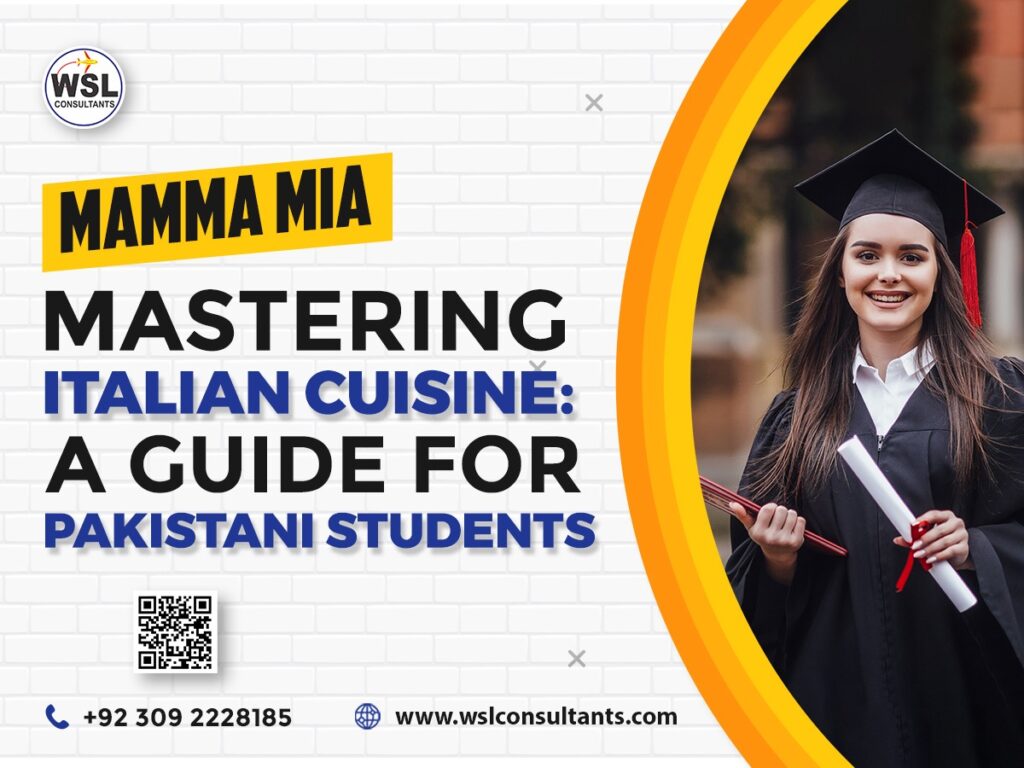A Guide for Pakistani Students: Mamma Mia! Mastering Italian Cuisine

Introduction
Embarking on a culinary journey from Pakistan For Pakistani students to the heart of Italy, students and food enthusiasts alike are often mesmerized by the simplicity, yet profound flavors of Italian cuisine. This guide offers a comprehensive exploration into Italian cooking, tailored for Pakistani students. It aims to bridge the gap between the rich, aromatic dishes of Italy and the robust, spice-infused flavors inherent in Pakistani cuisine. Whether you’re a novice cook or a seasoned foodie, this guide will help you navigate through the essentials of Italian cooking, infusing a touch of Pakistani flair.
1. The Essence of Italian Cuisine For Pakistani Students
Italian cuisine is renowned for its focus on fresh, high-quality ingredients, emphasizing the natural flavors of each component. The cornerstone of Italian cooking lies in its simplicity and respect for ingredients. Key elements include olive oil, fresh herbs like basil and oregano, garlic, ripe tomatoes, and an array of cheeses and pasta. Each region of Italy offers its unique take on these basics, creating a diverse culinary landscape. For Pakistani students, understanding these foundational principles is crucial in mastering authentic Italian dishes. It’s about learning to balance the boldness of flavors with the subtlety that Italian cuisine demands.
2. Creating an Italian Pantry in Home Town for Pakistani Students
The first step in your Italian culinary journey is to build an Italian pantry. Essential items include:
- Olive Oil: Opt for extra-virgin olive oil for dressings and light sautéing.
- Pasta Varieties: Stock up on spaghetti, penne, fusilli, and perhaps some less familiar shapes like farfalle or rigatoni.
- Tomatoes: Both canned and fresh Roma or San Marzano tomatoes are essential for sauces.
- Garlic and Onions: Fundamental for flavor bases in many dishes.
- Fresh Herbs: Basil, parsley, and oregano are key. Consider growing your own for freshness.
- Cheeses: Parmesan, mozzarella, and ricotta are versatile choices.
- Balsamic Vinegar: Ideal for salads and glazes.
Many of these ingredients are accessible in Pakistani markets For Pakistani Students, while some might require a visit to specialty stores.
3. Mastering Classic Italian Recipes
Begin your cooking adventure with some classic Italian recipes:
- Spaghetti Aglio e Olio: This dish, highlighting spaghetti with garlic, olive oil, and red chili flakes, is a testament to simplicity in Italian cooking.
- Margherita Pizza: Master this basic yet delightful pizza with a simple topping of tomato sauce, mozzarella, basil, and olive oil.
- Caprese Salad: Perfect as a starter, this salad combines fresh tomatoes, mozzarella, basil, and a drizzle of olive oil and balsamic vinegar.
These recipes not only introduce you to fundamental Italian cooking techniques but also allow room for experimentation and adaptation to local tastes.
4. Infusing For Pakistani Students Flavors into Italian Dishes
Incorporating Pakistani flavors into Italian dishes can create an exciting fusion. For instance, adding a pinch of ground cumin or coriander to a tomato sauce can introduce an intriguing twist. Or, consider using local Pakistani cheeses in place of Italian ones for a different flavor profile. Experimenting with spices and ingredients can lead to unique and delicious adaptations, merging the richness of Italian cuisine with the vibrant flavors of Pakistan.
5. Italian Desserts with a Pakistani Touch
No Italian meal is complete without a dessert. Classics like Tiramisu and Gelato can be adapted to suit Pakistani palates. For example, reduce the sugar in Tiramisu or incorporate local flavors like cardamom or rose water. Homemade Gelato can be flavored with mango or pistachio, popular flavors in Pakistan. These adaptations not only cater to local tastes but also introduce an element of familiar comfort in foreign cuisine.
6. Learning and Improving For Pakistani Students
To refine your Italian cooking skills, seek resources such as online tutorials, cooking workshops, or recipes from renowned Italian chefs. Many chefs offer insights into authentic Italian cooking techniques and ingredient use, which can be invaluable for beginners. Also, join cooking forums or community groups where you can share experiences and get advice from fellow cooking enthusiasts.
7. Embracing the Italian Dining Experience
Italian dining is as much about the experience as it is about the food. Meals are often enjoyed slowly, in the company of friends or family, making dining a social and enjoyable affair. Embrace this aspect of Italian culture in your culinary adventures For Pakistani Students.
Conclusion
Mastering Italian cuisine as a Pakistani student offers a gateway to a world of flavors, where the simplicity of Italian cooking meets the rich tapestry of Pakistani tastes. This journey is not just about cooking; it’s about cultural exploration and adaptation





